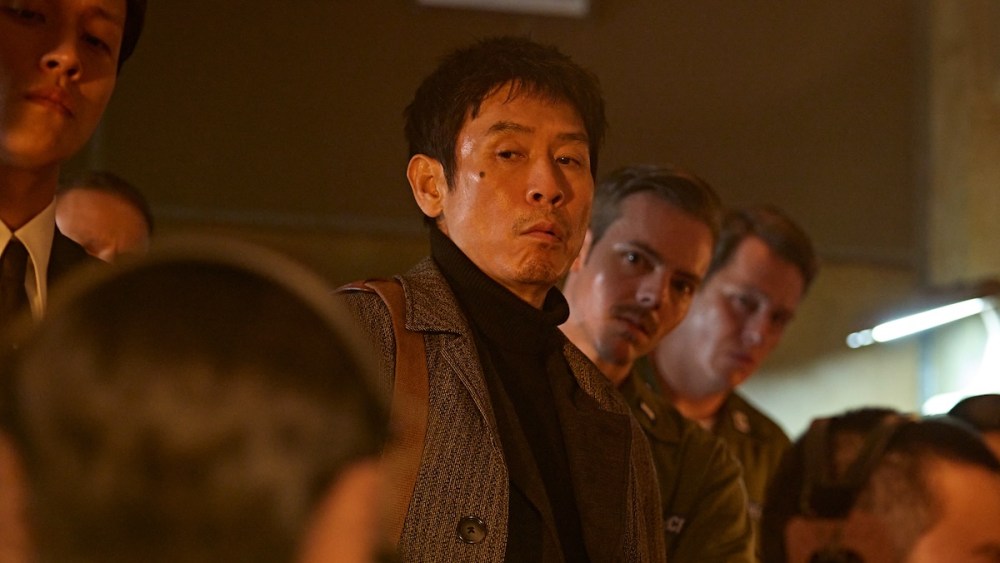Byun Sung-hyun’s Netflix film Good News is a black comedy inspired by real-life hijackings in Japan, South Korea, and North Korea in the 1970s, and marks the director’s fourth collaboration with acclaimed actor Sol Kyung-gu.
The film, produced by Star Platinum, is a dramatization of the 1970 hijacking of a passenger plane by communist groups and diverting it to Pyongyang. The story follows a mysterious fixer known only as “Nobody” (Sol), who leads a covert operation to guide planes to safety under Park Sang-hyun (Ryu Seung-beom), director of South Korea’s Central Intelligence Agency. Hong-kyung will play the role of Seo Go-myung, an elite air force lieutenant who unknowingly gets caught up in a mission to “double hijack” a plane from the ground. The ensemble cast also includes Takayuki Yamada, Kippei Shiina, Kim Seung-oh, Masaru Kasamatsu, and Nile Yamamoto.
For Byun, the project represented a deliberate turning point after his 2023 Netflix action thriller Kill Bok-sun. “I wanted to try my hand at black comedy, so I started researching real-life cases that would fit this genre,” the director told Variety. “When I first learned about this incident on a TV program several years ago, I thought it would be made into a movie someday, but I never imagined that I would be the one to film it.”
In creating the story, the director decided to fictionalize the behind-the-scenes dynamics while keeping the known facts intact. “In our research, we paid attention to the commonly known aspects of the case, the surface of the story,” he explains. “But the unknown internal dynamics, which also resonate with the film’s themes, are where I brought in the fiction. In other words, while the outcome remains nonfiction, I fictionalized the course of events leading up to it.”
“Good News” consists of five different chapters. “The tone changes slightly throughout the story, so I thought a chapter-based structure was the best way to manage these changes,” says Byun. “Otherwise, the atmosphere of the movie might have been uneven.”
“When we were working on the script, we relied on a chapter structure from the beginning, rather than completing the story first and then dividing it into chapters,” said the director. “I approached this work from the beginning with the intention of giving each chapter its own tone.”
Unlike traditional hijack thrillers that focus on suspense, Byun chose to focus on human behavior under pressure. “It wasn’t necessarily my intention for audiences to take away any particular message from the film; it was more my own ambition as a filmmaker to do something different,” he says.
Working with director Seol for the fourth time after “The Merciless”, “Kingmaker” and “Kill Bok-sun” was a unique challenge for Byun. “When you work with the same actor three times in a row, you inevitably end up using a lot of what he has,” he admits. “So I kept thinking, maybe we can still explore different sides of him.”
The solution came from revisiting Sol’s earlier works, particularly Lee Chang-dong’s 2002 masterpiece “Oasis.” “With For Nobody, I wanted the man to embody the idea of intentionally taking on the role of the Oasis character, as if the character were acting,” Byun explains. “As a result, his performance feels a little more theatrical and heightened than his usual tone. But at the same time, he sought to capture those fleeting, authentic moments that reveal Nobody’s true side.”
Although set during a politically tense period in Cold War history, Byun believes the film speaks to current geopolitical tensions. “I think the current situation is more or less similar,” he says. “I felt that even 50 years later, this story still resonates today because the core dynamics haven’t changed all that much.”
“In a way, this movie is similar to “Kingmaker,” because it tackles a genre that I’ve always wanted to do as a director,” says Byun. He distinguishes between “Good News,” which he took on mainly because of his work with star Jeon Do-young, and “Kill Bok-soon.” “I don’t really like action movies. To be honest, I rarely watch action movies,” he confesses.
“Political noir is challenging, but I personally believe that black comedy is an even more difficult genre to work with,” Byun added. “It was quite a challenge, but I was determined to do justice to this film.”
Byun is currently planning to try out various genres. “Personally, I got enough satisfaction from this work that I don’t think I’ll make another black comedy for at least 10 years,” he says. “I feel like I’ve cleared the hurdles I set for myself, so I’m going to try different genres in the future.”However, fans can expect his signature touch to remain. “I believe that no matter the genre, some kind of humor, especially sarcastic humor, is always present in my films,” he added.
“Good News,” which premiered at the Busan International Film Festival, is now available on Netflix.

